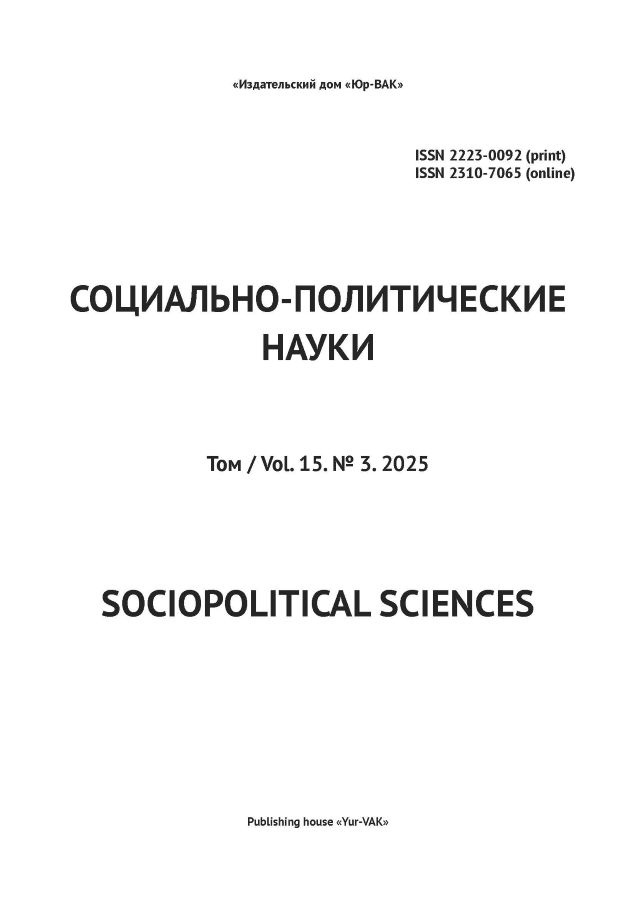Theoretical Aspects of Political Risks
- 作者: Panesh K.M.1
-
隶属关系:
- State Duma of the Federal Assembly of the Russian Federation
- 期: 卷 15, 编号 3 (2025)
- 页面: 27-35
- 栏目: Political Institutions, Processes and Technologies
- URL: https://journals.eco-vector.com/2223-0092/article/view/687835
- DOI: https://doi.org/10.33693/2223-0092-2025-15-3-27-35
- EDN: https://elibrary.ru/RCOCGK
- ID: 687835
如何引用文章
详细
The study examines the theoretical aspects of political risks. The intensification of the development of science and philosophy has led to the emergence of a number of studies addressing the issues of socio-political stability, as well as risk factors and destabilization of the socio-political situation. Among the most significant general theoretical approaches that contribute to understanding the problems of stability and risk in the dynamics of the socio-political system, one can single out research in the paradigm of tectology. Based on the analysis of key approaches to the interpretation of the category of political risk, the author defined it as a threat to destabilization and disruption of the integrity and functionality of the socio-political system that accompanies the general socio-political dynamics, as well as the adoption of specific political decisions. It is noted that the object of political risk is an integral system of socio-political interaction, while the sources of political risk may be of various nature and may go beyond socio-political phenomena, such as a natural disaster or a pandemic.
全文:
作者简介
Kaplan Panesh
State Duma of the Federal Assembly of the Russian Federation
编辑信件的主要联系方式.
Email: panesh_kaplan@mail.ru
SPIN 代码: 7735-6661
Cand. Sci. (Econ.); Deputy
俄罗斯联邦, Moscow参考
- Ajemoglu D., Robinson J. The economic origins of dictatorship and democracy. Moscow: Alpina Publisher, 2013. 496 p.
- Bulavina M.A., Novoselsky S.O. The role of higher education in ensuring national security of the Russian Federation in the context of the crisis of international relations. In: Trends in the development of the system of international relations and their impact on the management of national defense of the Russian Federation. Collection. Moscow, 2023. Pp. 76–83.
- Grashchenko N.Yu. Analysis of the relationship between the concepts of “Risk” and “Uncertainty”. π-Economy. 2010. No. 6 (112). Pp. 242–245. (In Rus.)
- Durkheim E. Suicide. A sociological study. St. Petersburg, 1912.
- Kapralin S.G. Differentiation of views on the definitions of “Risk” and “Uncertainty”. Bulletin of the Tomsk State University. Economy. 2013. No. 2 (22). Pp. 33–39. (In Rus.)
- Karpenko P.P., Seleznev A.V., Pelogeyko A.V. et al. Fundamentals of system analysis. Stolypinsky Bulletin. 2022. No. 4. Pp. 1991–2003. (In Rus.)
- Kissinger G. Diplomacy. Moscow: AST, 2007. 944 p.
- Kovaleva M.S. The evolution of the concept of “risk”. Sociological Review. 2002. No. 1. Pp. 18–26. (In Rus.)
- Krivenko N.V. A synergetic approach to the use of theories and models of change management in relation to organizations as socio-economic systems. Modern Management Technologies. 2015. No. 11 (59). Pp. 35–41. (In Rus.)
- Makarenko D.G. Public trust as a resource of power and management. Bulletin of Science and Practice. 2016. No. 8 (9). Pp. 129–132. (In Rus.)
- Morgenthau G. Politics among nations: The struggle for power and peace. 5th ed. Moscow: Moscow State University Publishing House, 2005. 512 p.
- Nechkin D.A. The evolution of the concept of “political risk”: Classical and modern concepts. Bulletin of the Moscow University. Episode 25. International Relations and World Politics. 2018. No. 4. Pp. 109–137. (In Rus.)
- Novoselsky S.O., Boserdt N.Yu., Khalina V.A. Assessment of political activity of Russian voters. Politics, Economics and Innovations. 2017. No. 1 (11). P. 1. (In Rus.)
- Popper K. The open society and its enemies. In 2 vols. Vol. 1. The Charms of Plato. V.N. Sadovsky (transl. from English gen. ed.). Moscow: Cultural Initiative; Phoenix, 1992. 446 p.
- Popper K. The open society and its enemies. In 2 vols. Vol. 2. The time of the false prophets: Hegel, Marx and other oracles. V.N. Sadovsky (transl. from English gen. ed.). Moscow: Cultural Initiative; Phoenix, 1992. 525 p.
- Rodrik D. Economic principles of political economy. Moscow: Higher School of Economics, 2008. 376 p.
- Stiglitz J. Globalization and its discontent. Moscow: The Whole World, 2003. 288 p.
- Williamson O. Economic institutions of capitalism. Moscow: Logos, 1996. 384 p.
- Waltz K. Theory of international politics. Moscow: MEI, 2010. 320 p.
- Friedman M. Capitalism and freedom. Moscow: IRISEN, 2004. 240 p.
- Hopf T. Theory of international relations. St. Petersburg: Piter, 2002. 576 p.
- Chetyrkina N.Yu., Vasilyeva Ya.A. The genesis and correlation of the concepts of risk and uncertainty. St. Petersburg Economic Journal. 2020. No. 2. Pp. 37–45. (In Rus.)
- Yutkina S.M. On the essence of state coercion. South Ural Panorama. 2015. No. 1 (68). Pp. 130–133. (In Rus.)
- Bertalanffy L. General system theory: Foundations, development, applications. New York: George Braziller, 1968. 295 p.
- Bull H. The anarchical society: A study of order in world politics. New York: Columbia University Press, 1977. 335 p.
- Capra F. The web of life: A new scientific understanding of living systems. New York: Anchor Books, 1996. 368 p.
- Holling C.S. Adaptive environmental assessment and management. New York: John Wiley & Sons, 1978. 377 p.
- Laszlo E. The systems view of the world: A holistic vision for our time. Cresskill, NJ: Hampton Press, 1996. 132 p.
- Laszlo E. Introduction to systems philosophy: Toward a new paradigm of contemporary thought. New York: Harper & Row, 1972.
- Mearsheimer J. The tragedy of great power politics. New York: W.W. Norton, 2001. 555 p.
补充文件








